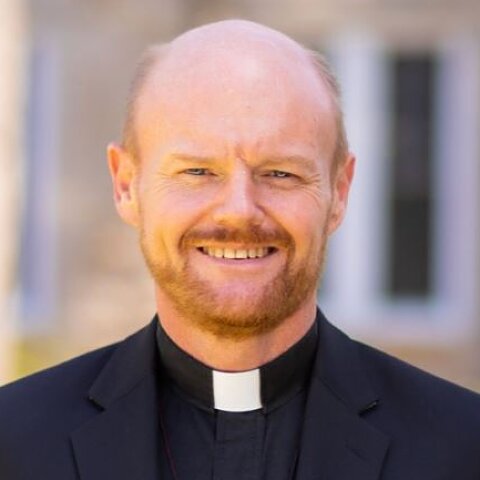Commentary on Psalm 148
The wording of the Proper Preface for Holy Communion varies a bit as we move through the church calendar, but it always ends with these or very similar words:
“And so, with all the choirs of angels, with the church on earth and the hosts of heaven, we praise your name and join their unending hymn:”1 The unending hymn that follows in which participants are invited to join is the “Holy, Holy, Holy,” which derives from the call vision of the prophet Isaiah who sees God enthroned and surrounded by praise.2 Taken together, what an all-encompassing call to join in a creation-wide praise of God! Such a call is precisely what we have in Psalm 148.
That praise of God is the overwhelming emphasis of Psalm 148 is unmistakable—the plural Hebrew imperative occurs ten times3 in the psalm’s thirteen verses. Hymns of Praise such as this one generally consist of two formal parts: a summons to praise, and a basis for the praise. The basis tends to lack the specificity found in Thanksgiving Hymns, and is usually either God’s steadfast love/compassion/faithfulness, or, as in the case of Psalm 148, God’s sovereignty and majestic power.
The summons dominate Psalm 148 through the ten imperatives, although they address two distinct choral locales: voices from the heavens (verses 1-5a) and from the earth (verses 7-13a). The first section carries a strong creation motif, with calls for praise from the angels, host,4 sun, moon, stars, highest heaven, and waters above the heavens.”5 Following the jussive summary command to all the aforementioned to praise, verses 5b-6 gives the basis for calling them to praise: It was God, who through command, created them and established them, with their bounds, forever and ever. In other words, praise is due to God for God’s immense creative power on display in, and even “above,” the heavens.
The call for praise from the earth includes an even more extensive inventory of participants: sea monsters, all deeps, fire, hail, snow, frost, stormy wind, mountains, hills, fruit trees, cedars, wild animals, cattle, creeping things, flying birds, kings, all peoples, princes and all rulers of the earth, young men, and women, old and young. While the basis for praise is no longer explicitly creation, it remains at least implicitly in verse 13b—you simply can’t overlook God’s glory over earth and heaven, so the earthly invitees could do no other but praise the name of the Lord. Further, in verse 14, the psalm speaks of God raising up a horn for his people Israel.6 Still, the emphasis remains on the awesome power of God and how that must evoke praise from all of creation.7
There are a number of ways the preacher may theologically weave this psalm into the proclamation on the Fifth Sunday of Easter. First and most generally, there is the obvious call to praise. What would our worship be, on this Sunday or any other, if it were not praise? So the psalm reminds us of why we gather.8
Further, and in relation to this point, the psalm reminds us with whom we gather. Much as with the Holy Communion Proper Preface, and as experienced by Isaiah in his call vision, we realize that our voice is invited into quite the chorus—one consisting of literally all of creation, both on and above the earth and the heavens.9
And perhaps most powerfully implicit, this psalm declares that praise necessarily involves gathering! All the Hebrew imperatives to praise are in the plural. Praise may not be impossible as an individual, but it reaches an apex otherwise beyond achievement and experience in the gathered worshiping community.
The reading from Acts for this Sunday offers the opportunity for a more precise textual weave. We learn that Gentiles are becoming believers. Peter even received grief for associating with some of these uncircumcised ones. The pericope goes on to recount Peter’s vision experience in Joppa that would eventually lead him to Caesarea and the literal beginnings of the Gentile church.
If the church is about anything, it is about the abundant all-inclusive love of God. Yet, to this day, we remain plagued by slanted views of who’s “in” and who’s “out.” Even when not actually present, this perception of the church from those who are literally on the outside all too often prevents them from ever approaching the doors.
Psalm 148 speaks to this situation by reminding us that while kings and princes are summoned to praise the name of God, so too are “creeping things and flying birds!” (verse 10). It’s a little more difficult to become haughty when we hear that a worm and a crow have a place in the praise of God just as we do. The suggestion made here by the psalm rings similar with Paul’s declaration that there is no longer slave or free, Jew or Greek, etc.10
Finally, we should return to the creation motif that is so prevalent in the psalm. In this regard, the reading for this day from Revelation is a helpful partner. John of Patmos speaks of seeing a new heaven and a new earth (verse 1) and of all things being made new (verse 5). These are all highly reminiscent, perhaps even directly drawn from, the prophecy of (third) Isaiah which was one of the appointed options for Easter Sunday.11 In both cases, there is a creation motif on par with that in Psalm 148.
To be more precise, there is a re-/new creation motif. The praise that Psalm 148 invites us into is not just for creation “in the beginning”, it also is for God’s ongoing creative acts—certainly to include, from a Christian perspective, the expansive recreation of covenant and our resulting recreation in Christ. Liturgy, including praise, is not play acting.12 When the Proper Preface is read, when we join the “Holy, Holy, Holy,” when the words of Holy Communion or Holy Baptism are spoken, we are both declaring and experiencing something of the new creation that God is in that very moment bringing about.
One of the characteristics of that new creation, when it is brought to completion, is that nothing will prevent any members of creation from doing what Psalm 148 calls upon us to do. None among wolf, lamb, lion or ox will be in pursuit or fear of the other.13 Their only pastime, and ours as well, will be to praise the name of the Lord. It is the very purpose given to us by Psalm 148. It is the purpose toward which the whole book of Psalms, whose Hebrew name means “praises,” and whose final five chapters are all hymns of praise, points us. Indeed, as the first answer of the Westminster Catechism instructs, the chief end of humankind is to glorify and enjoy God forever.
Notes
- The Easter Preface adds specificity to those who join the choir: Mary Magdalene, Peter and all the witnesses of the resurrection, earth and sea and all their creatures, angels and archangels, cherubim and seraphim.
- See Isaiah 6, especially verse 3.
- Twelve if we include the two third-plural imperfects of this verb used as a jussive commands in verses 5 and 13.
- The Hebrew word here typically means “armies”, which is the translation Alter prefers. He notes that in the heavenly realm, the word sometimes refers to the stars, although here it may be an elaboration on angels/messengers —God’s “battalion” of messengers. Robert Alter, The Book of Psalms: A Translation With Commentary (New York: W.W. Norton & Company, 2007), 509.
- This reference to “waters above the heavens” points to the ancient concept of the clear dome which is the sky pushing back and holding at bay the primordial waters in the midst of which God created the earth. See Genesis 1:6-8.
- The reference to a “horn” such as we have here is usually a symbolic indication of strength, although we are not told how God has thus given strength to Israel. Many commentators see this verse as a later addition to the psalm.
- In other ancient Near Eastern creation stories, the primordial waters (or the sea) are deified and must be defeated by a rival god to establish creation (such as in the Babylonian Enuma Elish where the god Marduk defeats the great sea monster Tiamat). That the “sea monster” is here subdued and part of the chorus of praise to God is further indicative of the incomparable creative power of God.
- Our consumerist culture has caused even worship to be viewed as something that is supposed to “please” us as paying customers. While worship should be a pleasant and nourishing experience, it is not the place where one should come always expecting to “have it your way.” Burger King will be happy to satisfy that inclination.
- This is a powerful theme to emphasize on All Saints’ Sunday.
- Galatians 3:28
- Isaiah 65:17-25
- Walter Brueggemann, The Message of the Psalms: A Theological Commentary (Minneapolis: Augsburg, 1984), 144.
- cf. Isaiah 65:25


May 15, 2022